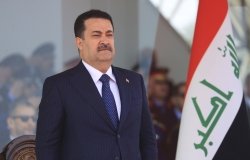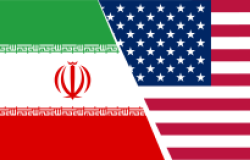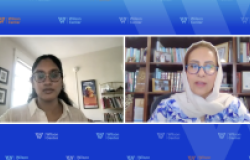'Unofficial' Peace Initiatives and Civil Society in the Israeli-Palestinian Conflict
Paul Scham, Visiting Scholar, George Washington University
Overview
According to Paul Scham, a visiting professor at George Washington University, the launching of the Geneva Accord on December 1, 2003 says something positive about both Israeli and Palestinian societies.
The Geneva Accord is not the first unofficial peace initiative, but it has received the most publicity and widespread support. Scham said Israeli Prime Minister Ariel Sharon and right-wing Israelis did the initiative a tremendous favor when they reacted with such animosity toward it, even before its official release. Sharon and others called Yossi Beilin, a former Israeli justice minister and one of the principal authors of the draft, a traitor, and vehemently denounced the Geneva Accord.
Scham pointed out that such a charge is without merit, as the Geneva Accord is not a legal matter and there was no betrayal of country. Scham also noted that the existential nature of the conflict makes it appropriate for civil society to be involved.
The current makeup of the Israeli government makes a peace agreement with the compromises outlined in the Geneva Accord virtually impossible. "I can't see any in the right-wing government supporting the compromises envisioned here, even if public opinion were to significantly change." Scham said that approximately 30 percent of Israelis supported the Geneva Accord, while 38 percent stood opposed. The undecided group, according to Scham, will be important in determining whether public support will be widespread enough to give the initiative more momentum.
Israeli society is deeply divided on the conflict with Palestinians. Polls show people's views are closer to more moderate candidates, but because they see Israel in existential danger, they have voted for and supported Sharon and right-wing hard-liners. The current Knesset (the Israeli parliament) will remain intact until 2007, making a peace plan like that envisioned in the Geneva Accord all but impossible. Scham said that a shift in public opinion on how to handle the conflict, in conjunction with deteriorating economic conditions, could result in a "major new political constellation."
On the Palestinian side, Yassir Arafat has not explicitly endorsed the Geneva Accord, though Scham said he is surely glad to have it. The most difficult issue for Palestinians is the right of return to Israel. The Geneva Accord does not specifically say "right of return," instead proposing a formula that would allow a small number of Palestinians inside Israel. Implicitly, Scham said, the Geneva Accord eliminates the right of return.
Scham pointed out that Arafat, as always, is playing both sides of the fence. His main goal, according to Scham, is to not become irrelevant, and in this regard he has outplayed both the United States and Israel. A civil society initiative that grows from the bottom up is the only way to force Arafat off the fence. Arafat prefers to follow Palestinian society, Scham said, and would likely work toward implementing something his people strongly supported.
Hosted By

Middle East Program
The Wilson Center’s Middle East Program serves as a crucial resource for the policymaking community and beyond, providing analyses and research that helps inform US foreign policymaking, stimulates public debate, and expands knowledge about issues in the wider Middle East and North Africa (MENA) region. Read more
Thank you for your interest in this event. Please send any feedback or questions to our Events staff.










